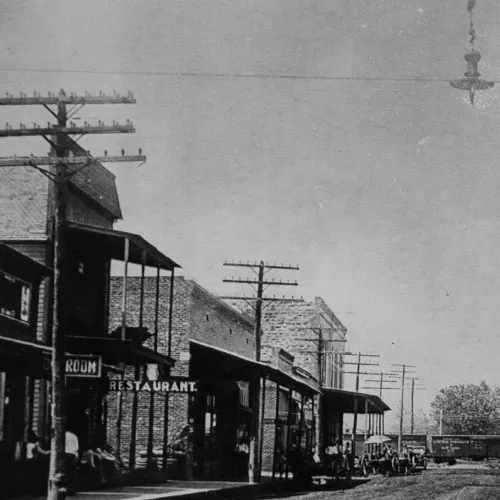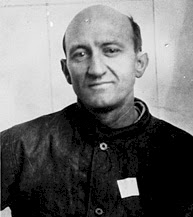2/3/1934 - Located fourteen miles to the southwest of Tulsa, the small town quiet of Sapulpa, Oklahoma (at the time, around 10,000 people call the area home), is shattered when a gunfight between outlaws and law enforcement officers breaks out at the home of farmer, Lee Davis. When the confrontation finally ends later in the day at a ditch in town, three crooks (Aussie Elliott, Eldon Wilson, and Raymond Moore) and two lawmen (Sapulpa Police Chief Thomas Jefferson Brumley and Sapulpa police officer C. P. Lloyd) will be killed.
Eldon Wilson (L) & Aussie Elliott (R)
A small town in the Oklahoma counties of Creek (the county seat) and Tulsa named after the area's first permanent settler (a Lower Creek Indian from Alabama that in 1850 establishes a trading post near the junction of Polecat and Rock creeks), Sapulpa has a spur of the Atlantic and Pacific Railroad reach the city limits in 1886, gets a post office in 1889, and is incorporated as a town on March 31, 1898. In the years that follow, the village will become a source of walnuts, brick and clay products, and a variety of glass manufacturing companies (because of the glass, it will be nicknamed "The Crystal City of the Southwest"), along with providing oil and cattle to the rest of the nation. The legendary United States roadway, Route 66 reaches the town in 1926 and gains the burg another nickname, "The Crossroads of America," with five major highways eventually converging in the town. And like many of it's fellow Oklahoma cities during the 1930s, with public enemies like Wilbur Underhill, Pretty Boy Floyd, Freddy Barker, Alvin Karpis, Ford Bradshaw, Bonnie & Clyde, Harvey Bailey, "Big" Bob Brady, Larry DeVol, George "Machine Gun" Kelly, Francis Keating and Thomas Holden running roughshod through the Midwest, the town is visited by criminal mayhem ... and it comes by way of a local citizen, Aussie "Blackie" Elliott.
News Of The Day
Using his participation in the Sallisaw robbery as a springboard for bigger jobs, there are rumors that Elliott is in on the next job of the Ford Bradshaw outlaw band when the group holds up the bank in Henryetta, Oklahoma and leaves town with a payday of $11,342 six days after Floyd's raid on his home town. What is known for certain is that Elliott next teams up with Oklahoma bandits Adam Richetti (an often drunken thief that will soon replace the often soused Birdwell as Floyd's partner ... though lots of the evidence suggests otherwise, he will executed in Missouri's gas chamber in 1938 for his purported role in the 1933 Kansas City Massacre that leaves four lawmen and bank robber Frank "Jelly" Nash, dead) and Edgar Dunbar on January 12, 1933 when the trio pilfers $3,000 from the bank in Ash Grove, Missouri. Heist successfully completed, the robbers hide out at the Bolivar, Missouri home of Richetti's older brother, Joseph. Before the group can pull off another caper though, Elliott is arrested on May 14, 1933. Behind bars again, Elliott is incarcerated for only five months before taking flight again on October 28, 1933, escaping the custody of the Osage County Jail of Pawhuska, Oklahoma with Joseph "Red" Carson, Eldon Wilson and two other crooks. Another huge manhunt ensues in Oklahoma, but instead of fleeing the state, Elliott teams up with bandits Raymond Moore and Eldon Wilson to plan their next robbery in a hideout at the home of Elliott friend, Lee Davis. Unfortunately for the thieves, Davis' home is located in Elliott's home town of Sapulpa.
Richetti
Authorities in Sapulpa on high alert after a jewelry store is robbed in the nearby town of Sand Springs earlier in the year, when a report is received of a sighting of "suspicious" men in town, Deputy Sheriff Wesley Gage and two other lawmen drive up and down the streets of Sapulpa looking for the strangers, but come up empty. The next day, Saturday, February 3, 1934, at a little after noon, the police department receives an anonymous tip that two strangers have been seen entering a small white house located on hill less than a mile to the west of Route 66 and only a short distance to the northeast of town. Hoping for better success than on the previous day, Gage recruits Sapulpa Chief of Police Thomas Jefferson Brumley, Special Officer Floyd Sellers, carrying a shotgun, and Sheriff Willis Strange to fill out his search team. Taking Strange's car from the local police station, the group soon discovers that white is a favorite paint color for many of the homes on the outskirts of town. The second home investigated is found to be occupied by former District Judge Fred Speakman, who tells the hunters that about a half mile to the north is the home of farmer Lee Davis, a structure situated half way up the side of a small incline providing unobstructed views of the road connecting Sapulpa and Tulsa and access to the Davis home. Driving up to the house, the lawmen see furtive movement on the ground floor of the home as a figure ducks out of sight behind one of the structure's front windows.
Brumley
Pulling up in front of the house, the four men cautiously leave the relative safety of Strange's car and begin taking up positions to surround whomever is in the building. While Gage heads to the far corner of the home, while Brumley walks towards the front door (the south side of the property). Reaching the corner of the home, Gage spots two men he recognizes are fugitives from 50-year jail sentences and recent escapees from the Pawhuska jail ... Aussie Elliott and Eldon Wilson. Gage yells, "Stop! Stop! Police Officers!" at the men, but instead, the two outlaws jump back inside the home. As Special Officer Sellers takes up a position on the other side of the house (the north side of the home ), Brumley pauses a moment and then yells, "Whoever is in there, come out now!" In compliance with Brumley's command, the owner of the home, Lee Davis slowly backs out of the house with his arms in the air saying "Sure! Sure!" to Davis that he get the other men inside to come out too. "You men in there, this is the police, we're not going to tell you again, get out here!" Seeming to comply, Elliott and Wilson appear in the doorway again with their arms raised, but unbeknownst to the lawmen, there is a third crook in the home, Dubert Carolin, aka Raymond Moore, hiding in the cellar at the back of the home. Standing up, without a warning, Carolin opens up on Brumley, an act that causes the other outlaws and lawmen to begin firing too when Wilson and Elliott drop their arms and go for. Hit in the chest by a slug from Carolin's weapon, 55-year-old Brumley, a veteran of ten years with the department dies instantly, leaving behind a wife and eleven children (the oldest is 33, the youngest is 12). Also dead instantly in the first bullet exchange is Sapulpa's own Aussie Elliott, who barely makes it out the door and does not make it to his 21st birthday. The modified pistol machine gun he is carrying is never pulled from its place of concealment in the outlaw's pants.
Officers Later With Strange's Bullet Riddled Car
Brumley's Wife And Eleven Children
The gunfire at the back of the house also knocks Wilson down, sending the felon to the floor of the structure's back porch clutching his stomach with a belly wound that will prove fatal. Taking cover from behind a cistern, Carolin ducks down and begins crawling for the safety of a nearby fence, but is spotted and pursued a short distance by Sellers and Gage. Shot in the shoulder by a slug from Gage's service revolver, but not downed, sprinting and shooting at his pursuers with a Luger converted into a 32-shot machine gun, Carolin, the only mobile outlaw, quickly vanishes into a nearby stand of trees. Gunfire silenced for the moment, the pair run back to the house where Sellers assists Strange in trying to render help to the fallen chief of police and in placing Davis in custody. Meanwhile, Gage runs down the road to find a neighbor with a phone. Successful, he calls for an ambulance to come to the scene of the shootout along with asking for the presence of more officers and ammunition. Only a few short minutes later, help arrives at the Davis farm in the form of three lawmen and two firemen, and soon after that, a taxi shows up with two more officers, one being a nine year veteran of the Supulpa police force, 34-year-old Officer Charles P. Lloyd (Brumley's body will be transported back to town in Strange's shot up car, while an arrested Davis and the mortally wounded Wilson are driven in another vehicle ... at trial later, for lying to officers and harboring the three bandits on his farm, Davis will be found guilty of being complicit in Brumley's murder and sentenced to life behind bars, a verdict that is verified by an Oklahoma appeals court in 1935) . With word going out to authorities around the state (upon being informed of the events in Sapulpa, in his fourth year in office, Oklahoma Governor William Henry Davis "Alfalfa Bill" Murray, will send 2 officers and 25 members of the Tulsa detachment of the National Guard to Sapulpa to assist the police), the manhunt for Carolin, aka Raymond Moore, begins almost immediately.
Lloyd
Civilian Searchers
Governor Murray
Gathering at the Sapulpa jail throughout the day (the structure is one of the most modern in the state and features floors made of eight-inch steel and fourth-floor cells that can only be reached by going up a single stairwell watched over by machinegun carrying guards), a crowd of over 500 citizens tries to whip itself into a lynching frenzy, but the wise decision of the governor to send guardsmen to the town provides a force that breaks up fist fights, identifies the lynch leaders, and keeps a relative peace in front of the jail. The potential for noose justice violence ends when Sheriff Strange convinces town leaders that all the criminals involved in the deaths of the two Sapulpa lawmen are dead too from their wounds. Five men gone, but Oklahoma still has more bodies to bury before the day's toll will be fully totaled.
Big News
In the early morning darkness of the 3rd of the month becoming February 4th, patrolling the streets of Chelsea, Oklahoma with the town's city marshal, 58-year-old Rogers County Deputy Sheriff, Albert Pike Powell, surprise three men in the process of burglarizing a hardware ... in the gun battle that results, Powell is killed, as is Ford Bradshaw gang member, Edward "Newt" Clanton. And rounding out 24-hours of carnage in the state, in the small town of Bokoshe, Oklahoma, Dr. H. T. King is shot to death and his son is wounded by an unexpected gunman, the city's marshal, Calvin Johnson. The front line for the epic war on crime that takes place in the United States during the turbulent 1930s, Oklahoma will lose thirteen more officers before the year is over, and a total of eighty-two men by the time the decade concludes (by comparison, Illinois will have 168 men lost in the performance of their duties during the same period of time, with Texas next at 173, and New York losing the most lawmen with 227 going to early graves before 1940 arrives).















No comments:
Post a Comment